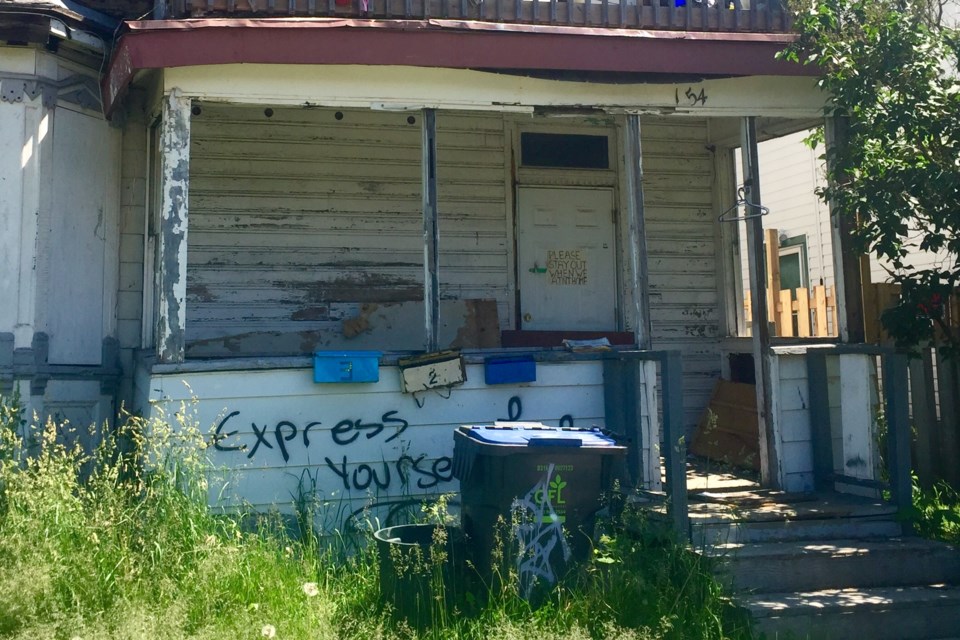Already in the midst of a serious crackdown on uncared-for properties, City Hall staffers are being told they need to do still more.
"There's a bunch of properties here that are decrepit and look terrible and are a blight on our city. What can we do to get rid of them?" Ward 3 Coun. Matthew Shoemaker demanded at City Council's most recent meeting.
"I think this council has been very clear that we have a much greater expectation of our bylaw enforcement and property standards maintenance," added Mayor Christian Provenzano.
"I think it's clear, based on direction from this council from the beginning of our term, the discussions we've had and some of the activity we're undertaking with our additional bylaw enforcement officer, that we want higher standards and we want the standards that we have to be met," the mayor said.
"And any standards that aren't met, we want them to be dealt with in the shortest amount of time that is legally possible, but also we want to be reasonable."
An enforcement blitz on messy yards and neglected buildings was declared earlier this year, with councillors agreeing to no longer waste time on unnecessary letters and warnings.
The target for fixing dilapidated buildings is now 35 to 36 days, compared to 81 to 82 days previously.
In June, council approved the hiring of Brant Coulter as the city's second bylaw enforcement officer and property standards inspector.
At their most recent meeting on July 15, councillors voted to initiate tax sale proceedings on 41 properties with a total of $510,304 in unpaid property taxes.
Owners will have 365 days to redeem their properties, after which they will be sold by the city.
But City Council wasn't content with all of that activity, pushing the city's senior management to search for additional ways to clean up our urban blight.
Ward 2 Coun. Luke Dufour pressed Shelley Schell, city treasurer and chief financial officer, for recent data about numbers of tax sales, and the possibility of acquiring neglected buildings for social housing.
Schell told him that in 2016, the city registered tax arrears certificates against 11 properties.
"Most of the time, properties are redeemed between the time that we registered the tax arrears certificate and when it ultimately goes to tax sale," she said.
In the case of 2016, only five properties remained unredeemed when the time came for a tax sale.
"It started picking up in 2017," Schell said. "We had 29. Seven went to tax sale, so most of them were redeemed."
Last year, the problem escalated again, with the city registering 40 tax arrears certificates.
With a tax sale looming this fall, Schell said: "Right now we're sitting at 16. We expect that number to go lower."
Schell told Coun. Dufour that under after a recent initiative with District of Sault Ste. Marie Social Services Administration Board, any unsold tax sale properties will be vested to the city and transferred to DSSMSSAB for a dollar if they have any interest in it.
"We haven't done them yet but there are a couple that are on the horizon that you'll see coming forward. DSSMSSAB's plan is to utilize to increase the social housing inventory," Schell said.
City staffers also fielded questions about whether it's possible to block landlords who've lost properties because of unpaid taxes from acquiring additional buildings through tax sales, and whether we might could get more for tax-sale properties by holding auctions.
"It appears that these regulations are quite strict as to what you can and can't do with them. We've got a process that we need to go through." said Karen Fields, city solicitor. "We've got a process that we need to go through."
"The regulations are very specific," added Schell. "It has to be a public, open process.... We have to follow that exactly."
Schell said most municipalities sell tax-sale properties through a tender process, although some have used auctions when strong interest existed.
Selling by auction may also limit the number of bidders, but Schell promised to look further into the idea.
Mayor Provenzano pushed her hard to find some way to pre-qualify buyers.
"Is there no way for a municipality to set up, almost a pre-qualification process?" the mayor asked.
"It doesn't make a lot of sense to have people that don't take care of their property and lose their property to tax sale, then just go and pick up a different property on tax sale. It's just a cycle."
"If people have a history of not taking care of their property, and not paying their taxes, doesn't the municipality have an ability to say: Okay, the highest bid wins, but you have to pre-qualify?" Provenzano asked.
"It has to be public. There's rules that govern it." Schell told the mayor. "We cannot limit who applies, as long as they meet the regulations and if they have the highest bid, they will be the owner of the property. We can't deny anybody access to the process."
Schell committed to do further research on that, and to look for other ways to deal with the problem."Since 2016, we see the number of properties that are going to be registered are increasing, but the amount that go to tax sale doesn't seem to be increasing at the same rate," she said.
"We are looking at our tax policy and different ways of interacting with taxpayers, proactive measures in collecting taxes."
